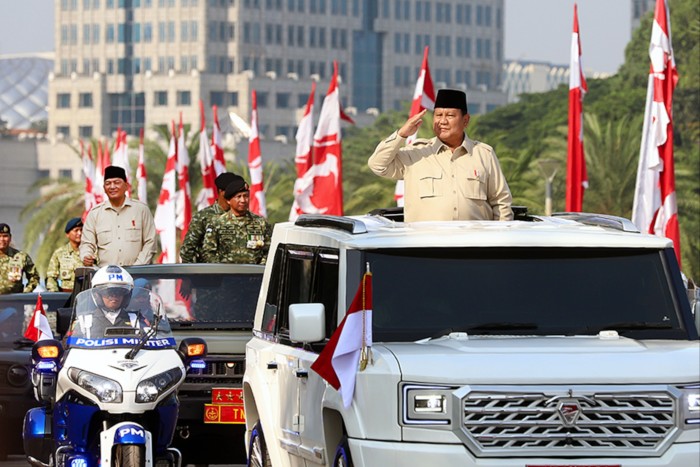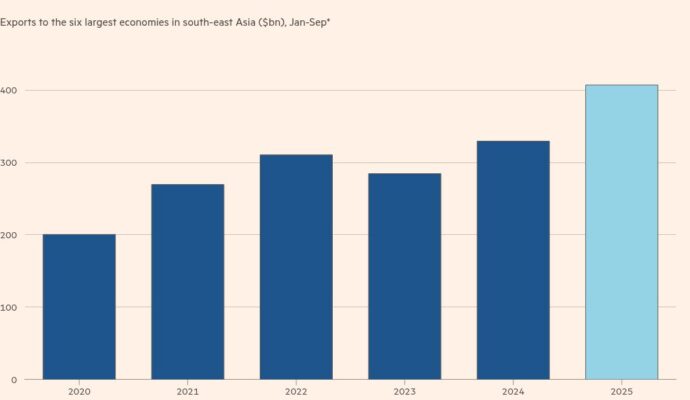Unlock the Editor’s Digest for free
Roula Khalaf, Editor of the FT, selects her favourite stories in this weekly newsletter.
Indonesia is increasingly turning to rarely used cash buffers to fund President Prabowo Subianto’s economic plans, raising concerns about the country’s ability to deal with shocks at a time of growing fiscal risks.
Over the past five weeks, Indonesia has announced plans to use Rp286tn ($17.2bn), or 62.5 per cent, of accumulated cash reserves of Rp457.5tn to boost liquidity in the banking system and establish new village co-operatives.
These cash reserves, held by the central bank and known by their Indonesian acronym SAL, have accumulated over the years. They have traditionally served as a safety net during revenue shortfalls or emergencies such as the Covid-19 pandemic.
The sharp drawdown of the reserves has raised concerns among economists that Indonesia’s fiscal buffers are being diminished at a time when its budget is under pressure from Prabowo’s big spending plans.
“Using a large share of SAL reduces the fiscal buffer against revenue shortfalls or shocks later in the year,” said Bank Permata’s chief economist Josua Pardede.
“Indonesia’s fiscal position is not under acute pressure at present, but it is operating with tighter cushions than usual,” Pardede said. Tapping SAL reduces the government’s buffer to absorb late‑year surprises without additional borrowing or spending cuts, he added.

The government has argued that it was preferable to deploy available funds rather than let them sit idle, but economists say the reserves would be better saved for countercyclical shocks.
Economists have also questioned the effectiveness of a liquidity injection, pointing to low demand for loans. Credit growth is near three-year lows amid falling purchasing power and a weak jobs market.
Prabowo has embarked on a big shift in economic policy, prioritising rapid growth over the fiscal discipline that had anchored foreign investor confidence.
His economic platform is centred on expensive welfare programmes such as free meals for schoolchildren — which alone will cost an estimated $28bn per year — as well as affordable housing and village co-operatives.
The programmes have strained state finances, resulting in the government cutting education and infrastructure to free up funding.
Prabowo added to the mounting fiscal concerns last month when he fired long-serving finance minister Sri Mulyani Indrawati, who had prioritised fiscal prudence. Her replacement, Purbaya Yudhi Sadewa, is more geared towards growth.
Sri Mulyani in September had said that Rp16tn of SAL would be used to fund village co-operatives.
But Purbaya has aggressively expanded disbursement, with Rp200tn sent to major banks with an aim of stoking credit growth and economic activity. This week, he said the government has withdrawn a further Rp70tn, some of which would be provided to regional developmental banks.
The liquidity flush into the banking system could result in higher inflation and a rise in non-performing loans, said Rully Arya Wisnubroto, senior economist at Mirae Asset Sekuritas.
“Many policies are seen as overly pro-growth and lacking prudence,” he said. “The fiscal risk at this point is quite high.”
Indonesia has projected a 2 per cent increase in state revenue this year from 2024. But the trend has gone in the opposite direction, with revenue dropping 8 per cent between January and August, according to the finance ministry.
The government will also lose revenue from the diversion of dividends from state-owned enterprises to newly formed sovereign wealth fund Danantara.
Nomura has forecast revenue will fall 2.5 per cent this year, flagging the risk of a “potentially larger underperformance”.
Brian Lee Shun Rong, an economist with Maybank Investment Banking Group, said the large SAL deployment had reduced Indonesia’s flexibility.
“SAL is usually a contingency fund rather than one to be used as a fiscal policy,” he said.
He projected Indonesia’s fiscal deficit would hit 2.9 per cent next year, just below the legal cap of 3 per cent. “Then the government will be faced with a choice of whether to rationalise spending or relook at some of their programmes such as free meals,” he said.


